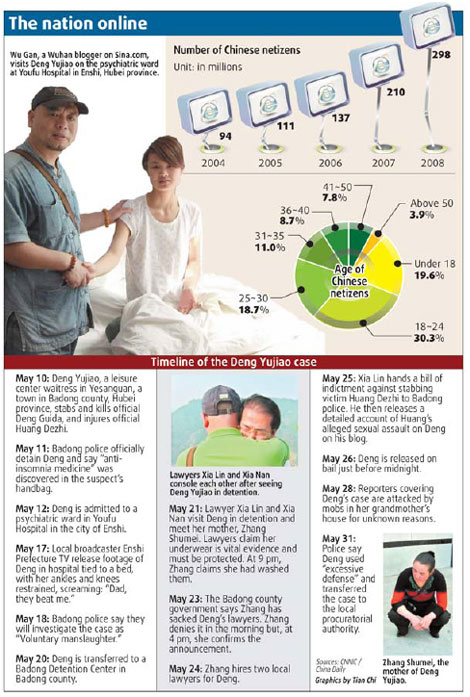
|
CHINA> Regional
 |
|
Official-killer's case fires up netizens
By Cai Ke (China Daily)
Updated: 2009-06-04 09:59 For his blog entry on May 24, Xia Lin wrote a detailed reconstruction of the events that led up to the stabbings on May 10, based on conversations with Deng Yujiao. In it, he accused Deng Guida and Huang of attempted rape.
At 9 pm that day, the Badong county authority announced Zhang had hired two local lawyers - Wang Shaopeng of the Wuhan-based Li Feng Law Firm, and Liu Gang of Chengye Law Firm, Yichang - to defend Deng Yujiao. The move sparked more activity online, this time including a fake blog on sina.com.cn, set up to look as though lawyer Wang had written it. In it, the author argued Deng was guilty. When it was also suggested Wang was a legal advisor to the Hubei government, the blog was lambasted by netizens. It was shortly followed by an entry containing the personal details of both lawyers, including their home addresses, phone numbers and emails. The blog was later closed down. China Daily was unable to reach the lawyers by phone. A receptionist at Wang's office said: "I haven't seen him or been able to reach him since he took the case." Netizens also released the personal details of Deng Guida, 44, who was director of business promotion office for Yesanguan, Deng Zhongjia and Huang. Their families are believed to have gone into hiding. Deng Yujiao was released from detention on May 26. Days later, the police issued a statement saying she had used self-defense with "excessive force" and her case had been passed on to the local procurator's office. No formal charges have yet been made. Netizens continue to watch avidly as the case progresses, but their growing involvement in high-profile cases such as Deng's has helped coin a new phrase: public judges. Not content with being able to just air their opinion online, netizens now demand more information and are ever-quick to jump to conclusions when it comes to questions of guilt. In the case of Hu Bin, a 20-year-old man who hit and killed a college graduate while racing his Mitsubishi Evo against friends in Hangzhou, Zhejiang province, last month, web users immediately demanded he be charged with "endangering public security" before police had concluded their full investigation into the cause of the tragic accident. "The public don't have the right to legally judge anyone," said a Legal Daily editorial recently. "Public opinions may sometimes conflict with the rationality of law. "The media is the source of the public's knowledge, but it sometimes reports unsubstantiated details. In the course of law, details differentiate guilty and not guilty, even life and death." Zhou Zhe, a professor with China Youth College for Political Science in Beijing, told China Daily: "I think it is a good thing netizens are taking part in public inquiries. They have the right to express their point of view. "But the government must make independent judgments and only adapt what is reasonable, and never lose its impartiality." Zhou suggested netizens should not be regarded as a singular group of people, adding: "There could be professionals who see things from their position, government officials who wish to disperse rumors or ordinary people. "Online or otherwise, people should act within the law."

|
|||||